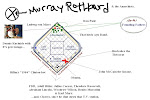Sometime last year, the Columbia Daily Spectator had a blarticle titled "In Defense of Libertarianism", written to no surprise by someone who clearly does not understand libertarianism. He makes a fairly unbiased, but albeit, misinformed analysis of the pros and cons of the libertarian doctrine. I speculate that the impetus for writing it was a mixture of the CUL blog and the growing freedom movement, especially since it has been more vocal in the past couple months.
I was upset by this blog post. Not that I dislike libertarianism from appearing, in an blog post, media is always good. Despite a few flaws here and there, I can actually swallow this.However, the writer makes one comment towards the end, which showed me he had studied libertarianism more than I perceived:
"Well, not really. That's a facile, straw-man understanding. Libertarians aren't anarchists (at least, not the smart ones)-they understand that some government is necessary just to make people get along. How much government? A police force seems necessary. A defense force probably, as well. Other institutions? Perhaps. But does the government know what crops should be grown, and when and where and how much, let alone what farmers should do the growing? Libertarianism predicts what experience shows: over-regulation is a recipe for naught but pork-barrel cronyism."
It's a pretty loaded statement he makes (which I highlighted in bold) because if he's read most serious libertarian papers, he would have realized that the "smartest" libertarians are indeed anarchists. That's because most libertarians follow the non-aggression axiom, and the logical deductions that are derived from that principle is that you can't support a coercive monopoly of law and public security.






"If you grant that it is legitimate for people to band together and allow the State to coerce individuals to pay taxes for a certain service — "defense" — why is it not equally moral and legitimate for people to join in a similar way and allow the State the right to provide other services — such as post offices, "welfare," steel, power, etc.? If a State supported by a majority can morally do one, why not morally do the others?" I confess that I see no answer to this question. If it is proper and legitimate to coerce an unwilling Henry Thoreau into paying taxes for his own "protection" to a coercive state monopoly, I see no reason why it should not be equally proper to force him to pay the State for any other services, whether they be groceries, charity, newspapers, or steel. We are left to conclude that the pure libertarian must advocate a society where an individual may voluntarily support none or any police or judicial agency that he deems to be efficient and worthy of his custom." (Murray Rothbard from "Are Libertarians "Anarchists"?-http://mises.org/story/2801)
ReplyDelete